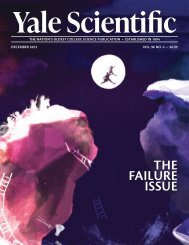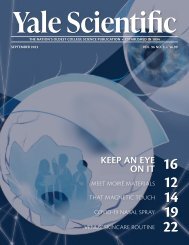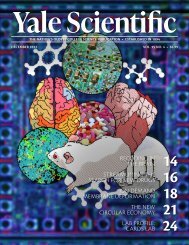YSM Issue 97.1
Create successful ePaper yourself
Turn your PDF publications into a flip-book with our unique Google optimized e-Paper software.
COUNTERPOINT<br />
Elon Musk has blown up Twitter—sorry, X—again!<br />
On January 29, 2024, the multibillionaire investor<br />
and innovator announced that human trials for<br />
the long-anticipated Neuralink brain implant project<br />
have finally begun. The tweet specifically read, “The first<br />
human received an implant from @Neuralink yesterday<br />
and is recovering well. Initial results show promising<br />
neural spike detection.” Now, some of you may already<br />
recognize the impact of such an announcement. But for<br />
those just entering the complex world of neurotechnology,<br />
here’s a small crash course.<br />
Neuralink, an ambitious tech company, was quietly<br />
started in 2016 by Musk as his first foray into the incredible<br />
sector of neurotechnology. Three years later in 2019, the<br />
company made its first major splash in the news when<br />
it unveiled its main project: the development of a small<br />
brain implant called N1. N1 is about the size of a coin,<br />
with wires thinner than human hair running through the<br />
brain. Ideas, theories, and hopes for Neuralink’s future<br />
were matched by a healthy dash of skepticism about<br />
cyborgs and the artificial intelligence (AI) singularity.<br />
Of the various features unique to the N1 brain chip,<br />
the most interesting is the novel electrode density on<br />
the sixty-four threads at 1,024 electrodes, which pick up<br />
signals from neurons. With this, the device will be able<br />
to collect much more brain data which would allow for<br />
more precise control from the user. Such precision could<br />
manifest itself in more accessible computer interfaces,<br />
prosthetic devices with fine motor controls, and<br />
treatment for neurological disorders such as Parkinson’s.<br />
It could bring us one step closer to allowing people who<br />
lost their arms to play the guitar again.<br />
Despite its great potential, common worries about<br />
Neuralink stem from Musk’s turbulent track record<br />
in business management. This huge development<br />
was announced in a tweet and was not registered on<br />
ClinicalTrials.gov, a database most research institutions<br />
use to monitor research protocols. All we have is the<br />
brochure Neuralink used to find volunteers for the<br />
Mind Over Matter:<br />
Neurolink’s Groundbreaking<br />
BRAIN-COMPUTER<br />
Interface Implantation<br />
By Lee Ngatia Muita<br />
research. The brochure claimed the study would take<br />
about six years with ‘regular follow-ups’.<br />
While not strictly illegal, it is troubling that the public<br />
does not know what protocols the company is taking to<br />
conduct these human experiments. What makes it more<br />
disturbing is that the animal rights group Physicians<br />
Committee for Responsible Medicine previously<br />
accused Neuralink of mistreating the monkeys used for<br />
experiments with the brain chip. Claims such as these<br />
are deeply worrying when it comes to experimentation<br />
on the human brain. Novel brain chips are touted to be<br />
built for long-term use, yet the only way to verify this<br />
longevity is to wait and see if things go wrong with time.<br />
This could mean a stroke or death. Yet Musk is not<br />
known to be a patient man.<br />
This technology would be wonderful if successfully<br />
developed, but first, we need Neuralink to improve in a<br />
variety of ways. We need more transparency regarding<br />
Neuralink’s research procedures, a demonstration of<br />
their dedication to maximizing the safety of the implant<br />
chip, and an indication of their accountability for the<br />
various allegations they are facing. While many remain<br />
cautiously optimistic about the future of this technology,<br />
we cannot forget that the man who is feeding us these<br />
Neuralink updates once tweeted, “Next, I’m buying<br />
Coca-Cola to put the cocaine back in.”<br />
Humanity stands to benefit greatly from the<br />
development of such incredible technologies, but with<br />
great power comes great responsibility. One only needs<br />
to look at the success of OpenAI’s generative models<br />
to see how much the public appreciates transparency<br />
from companies when presenting epic and somewhat<br />
scary technology. Building trust with the target<br />
market for developing technology is important in<br />
establishing a loyal customer base that will understand<br />
the complications that arise from experimentation.<br />
This is a lesson Neuralink must learn quickly before<br />
something devastating happens to an innocent<br />
human brain. ■<br />
38 Yale Scientific Magazine March 2024 www.yalescientific.org

















